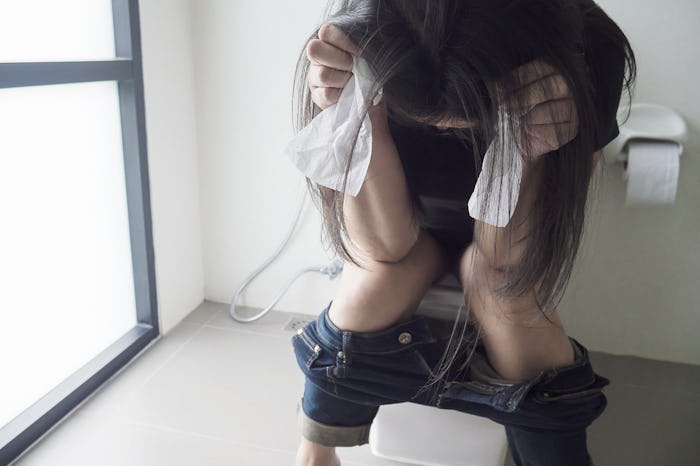There are all kinds of ailments that can make you feel like you're living in the 10th level of hell: flu, sinus headaches, lower back pain, paper cuts. But the one that has a degree of suffering all its own is urinary tract infections. The symptoms of a UTI are the "Baby Shark" of illnesses: When you have one, it's pretty much the only thing on your mind until the discomfort goes away.
As the Mayo Clinic explained, a urinary tract infection refers to any infection that affects the urinary system. A lower urinary tract infection affects the bladder and/or the urethra (where the urine comes out); an upper UTI involves the kidneys and/or the ureters (the tubes that connect the kidneys to the bladder). However, what we commonly think of as a UTI is a bladder infection, also known as cystitis.
Women are particularly at risk for UTIs, according to the National Institutes of Health's kidney, diabetes, and digestive disease division. A full 40 to 60 percent of us will get one in our lifetime. It's partly a matter of anatomy; our urethras are shorter than men's and closer to the rectum, making it easier for bacteria to enter the opening during sex or when using the bathroom. (Hence the advice you hear all the time about peeing after intercourse and wiping from front to back.) A recent French study of urinary tract infections in various countries suggests that UTIs are slightly more likely to happen in the summer.
But since we women are also prone to ignoring our health as we take care of all the other people in our lives, we may try to deny or downplay the symptoms of a urinary tract infection. It's a tactic that can backfire; untreated, cystitis can lead to more bladder infections or even kidney damage. So don't be a sufferer in silence: If you notice any of the symptoms below, seek medical help.
1You Always Need To Be Near A Bathroom
The classic symptom of a bladder infection is an increase in urgency — a constant feeling that you need to go, even if you've just used the bathroom recently. And when you do urinate, not much may come out, according to WebMD. If you're a busy mom, that alone should cue you to see a doctor; who has time to keep running for the toilet when you have kids to look after?
2It Hurts To Go
Another telltale sign that a UTI is brewing is a burning sensation when you pee, noted Johns Hopkins Medicine. And once you do go, the relief you normally feel after urinating is short-lived, and the sense of pressure and urgency comes back quickly.
3You Have Pelvic Pain
According to the American College of Obstetricians and Gynecologists, women who have a urinary tract infection may feel pelvic pain, especially just above the pubic bone. Pain in the back or sides may also be present.
4Your Pee Smells Awful
This may fall under the TMI category, but it's still important to know that a UTI may cause your urine to have an unpleasant or strong smell, according to NYC-based urologist Ojas Shah, MD, in an interview with SELF. The bacteria that cause the infection can affect the odor of the urine, so if you're noticing a change in odor along with the discomfort (and you haven't had any asparagus recently) a UTI is possibly to blame.
5Your Urine Is Cloudy
Cloudy or cola-like urine is also common with a urinary tract infection. Your pee may even be bloody, although WebMD explained that you can't always tell by looking whether there is blood in the urine, and only a lab test can tell for sure. Either way, discolored pee, especially coupled with other symptoms, is a signal that it's time to see the doctor.
Left untreated, a lower UTI can spread to the kidneys, causing additional symptoms such as fever, chills, and back pain, explained the Mayo Clinic. And though drinking water and/or cranberry juice can help you ward off UTIs, they're not a cure if you already have one. To clear up the infection once and for all and get you on the road to health, you'll need a course of antibiotics. So if you notice any of these characteristic signs that your system is trying to fight off a urinary tract infection, don't blow it off; get it checked out by a medical professional stat.
